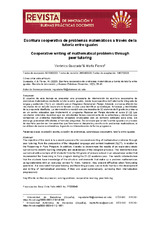| dc.contributor.author | Quezada Hernández, Verónica | |
| dc.contributor.author | Flores Coll, Marta | |
| dc.date.accessioned | 2023-12-12T08:06:35Z | |
| dc.date.available | 2023-12-12T08:06:35Z | |
| dc.date.issued | 2023 | |
| dc.identifier.issn | 2531-1336 | |
| dc.identifier.uri | http://hdl.handle.net/10396/26315 | |
| dc.description.abstract | El objetivo de este trabajo es presentar una propuesta de intervención de escritura cooperativa de problemas matemáticos mediante la tutoría entre iguales, desde la perspectiva del tratamiento integrado de lengua y contenido (TILC), en relación con el Programa Razonar en Pareja. Además, se busca difundir los resultados de un estudio exploratorio llevado a cabo para identificar aprendizajes, fortalezas y debilidades de la propuesta diseñada. La intervención se realizó con una muestra de 32 alumnos de 5 grado de primaria en un centro educativo que implementó el programa Razonar en Parejadurante el curso 21-22 Los resultados obtenidos muestran que los estudiantes tienen conocimiento de la estructura y elementos que componen un problema matemático utilizando enunciados con un contexto cotidiano para ellos, sin embargo, presentan dificultades al formular preguntas. Se concluye que la tutoría entre iguales y el proceso de escritura pueden ser herramientas que favorecen el desarrollo y escritura de problemas matemáticos, si se utilizan de manera sistemática, logrando su internalización de forma progresiva. | es_ES |
| dc.description.abstract | The objective of this work is to present a proposal for cooperative writing of mathematical problems through peer tutoring, from the perspective of the integrated language and content treatment (ILCT), in relation to the Reasoning in Pairs Program. In addition, it seeks to disseminate the results of an exploratory study carried out to identify learning, strengths and weaknesses of the designed proposal. The intervention was carried out with a sample of 32 students from the 5th grade of primary school in an educational center that implemented the Reasoning in Pairs program during the 21-22 academic year. The results obtained show that the students have knowledge of the structure and elements that make up a problem mathematician using statements with an everyday context for them, however, they present difficulties when formulating questions. It is concluded that peer tutoring and the writing process can be tools that favor the development and writing of mathematical problems, if they are used systematically, achieving their internalization progressively. | es_ES |
| dc.format.mimetype | application/pdf | es_ES |
| dc.language.iso | spa | es_ES |
| dc.publisher | UCOPress | es_ES |
| dc.rights | https://creativecommons.org/licenses/by-nc-nd/4.0/ | es_ES |
| dc.source | Revista de Innovación y Buenas Prácticas Docentes, 12(2), 26-41 | es_ES |
| dc.subject | Expresión escrita | es_ES |
| dc.subject | Solución de problemas | es_ES |
| dc.subject | Aprendizaje cooperativo | es_ES |
| dc.subject | Tutoría entre iguales | es_ES |
| dc.subject | Written expression | es_ES |
| dc.subject | Solving problem | es_ES |
| dc.subject | Cooperative learning | es_ES |
| dc.subject | Peer tutoring | es_ES |
| dc.title | Escritura cooperativa de problemas matemáticos a través de tutoría entre iguales | es_ES |
| dc.title.alternative | Cooperative writing of mathematical problems through peer tutoring | es_ES |
| dc.type | info:eu-repo/semantics/article | es_ES |
| dc.relation.publisherversion | http://www.uco.es/ucopress/ojs/index.php/ripadoc/index | es_ES |
| dc.rights.accessRights | info:eu-repo/semantics/openAccess | es_ES |

